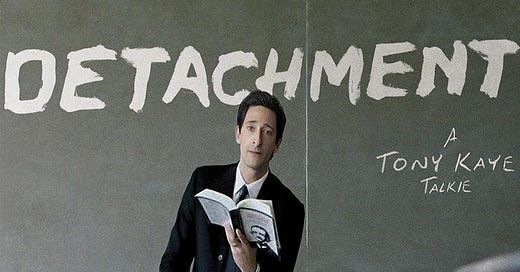Reading as Resistance: How to Reclaim Our Minds from Media Influence
Inspired by the movie Detachment
The inspiration for this essay comes from the thought-provoking film Detachment. The movie delivers a powerful commentary on how our society is influenced and shaped by the images and narratives constantly provided to us. It compels us to question the very fabric of our reality—what we believe, how we perceive ourselves, and the forces at play that mold our consciousness.
A “marketing holocaust” quietly encroaches upon the sanctity of our minds, a term that captures the relentless bombardment of images and ideas that shape our thoughts, desires, and even self-perception. The core question here is: how can we imagine anything when the images are always provided for us?
Media saturation has normalized a kind of “doublethink,” a term George Orwell used to describe the act of accepting two contradictory beliefs simultaneously. This is evident in how we’re fed ideas about what we should look like, how we should act, and what we should aspire to be. Society tells us, “You need to be pretty to be happy,” and “Surgery will make you beautiful.” These messages aren’t just about appearance; they dictate our worth and identity.
Young men and women are especially targeted by these narratives. For young women, there’s an overwhelming emphasis on being thin, fashionable, and flawless, leading to a relentless pursuit of an unattainable standard. Meanwhile, young men are bombarded with toxic portrayals of masculinity, where women are dehumanized and reduced to objects to be used. This isn’t just a side effect of culture; it’s a deliberate, calculated message that sells products and lifestyles at the expense of our mental and emotional well-being.
“Marketing holocaust” goes beyond the sale of products; it’s about shaping consciousness. It’s an ongoing assault on the mind, a 24-hour cycle of persuasion designed to numb our intellect and turn us into passive consumers. This psychological manipulation leads to a significant loss of individuality and critical thinking, as it molds our reality based on carefully crafted lies.
Fighting back involves reclaiming our imagination and learning to think critically. Reading becomes a form of resistance—a way to cultivate our own consciousness and break free from the narratives forced upon us. It’s not just about consuming words but engaging with ideas that challenge us to think, question, and imagine beyond what we’re told. Reading stimulates our imagination, allowing us to form our own belief systems and defend our minds against the pervasive dullness.
Cultivating critical thinking isn’t just an academic exercise; it’s a means of survival in a world intent on shaping our thoughts. Seeking out diverse perspectives, questioning the images and messages we’re constantly exposed to, and developing a mindset that values inquiry over passive acceptance are crucial. For Generation Z, this is particularly important. Growing up in an age dominated by social media and instant gratification, the ability to think critically and independently becomes a vital tool for navigating a world filled with contradictions.
This effort goes beyond preserving individual minds; it’s about creating a collective movement that values authenticity and depth. It’s about asserting our right to imagine, to dream, and to define our own reality. Defending our ability to think independently, challenging the status quo, and rejecting the dullness that seeks to confine us within narrow definitions of who we should be is an act of liberation.
Generation Z holds the potential to lead this charge. With access to diverse sources of information and platforms to amplify their voices, they can push back against the narratives that seek to limit them. By embracing reading, critical thinking, and self-awareness, they can help build a future where imagination and individuality are celebrated, not suppressed.
Reclaiming our minds is a form of rebellion, a declaration that we refuse to be defined by the images handed to us. Inspired by Detachment, this journey is about envisioning a world that is truly ours—one shaped not by the dullness of conformity but by the richness of our imagination and understanding. This is the power we hold: to envision, to challenge, and to create a reality that is not dictated by the images provided for us but by the depth of our own understanding and creativity.



